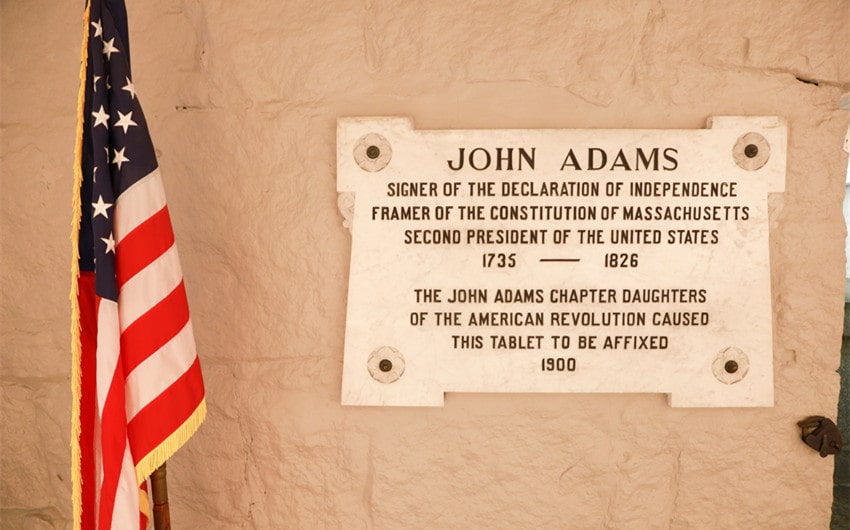John Adams Fun Facts: 12 Tidbits From His Remarkable Life
John Adams was not only a Founding Father and the second U.S. President, but also a fascinating figure with a unique personality and a remarkable life. From his strong principles to his close bond with his wife, Abigail, Adams’s story is full of intriguing moments that reveal his dedication, humor, and quirks.
If you’re curious to learn more about the man behind the title, these John Adams fun facts offer a closer look at his life, his accomplishments, and the legacy he left on American history. Here are some of the most surprising and memorable facts about John Adams.
Background on John Adams

Image source: Pinterest
John Adams was born on October 30, 1735, in Braintree, Massachusetts (now Quincy), into a modest farming family. Influenced by his father’s values, he developed a strong work ethic and sense of duty early on. Though initially uninterested in school, Adams found his academic passion and attended Harvard, where he excelled in philosophy, history, and law—skills that would shape his future as a statesman and advocate for American independence.
As one of the earliest and most vocal supporters of independence, Adams played a crucial role in the American Revolution. Serving in the Continental Congress, he helped draft the Declaration of Independence, using his persuasive skills to rally support for the cause. His commitment to liberty and justice extended beyond independence. Today, John Adams is remembered as a dedicated patriot, advocate of the rule of law, and champion of American independence.
Fun Facts About John Adams

Image source: Pinterest
John Adams lived a life full of unique achievements, strong principles, and memorable quirks that make him one of the most fascinating Founding Fathers. Here are some fun facts that showcase his character, values, and contributions.
1. Defended British Soldiers in the Boston Massacre Trial
In 1770, following the Boston Massacre, Adams took on the controversial role of defending the British soldiers involved in the incident. He believed firmly in the principle that everyone deserves a fair trial, even those seen as enemies of the colonies.
Adams argued that the soldiers had acted in self-defense against a violent mob, ultimately winning acquittals for most of them. His decision to defend these men was unpopular but demonstrated his commitment to justice and law, qualities he would carry throughout his career. Later in life, Adams cited this case as one of his proudest moments, underscoring his strong moral compass.
2. A Long, Loving Marriage with Abigail Adams
John and Abigail Adams shared a marriage that was not only loving but intellectually rich. They supported each other through lengthy separations due to Adams’s political duties, exchanging hundreds of letters filled with advice, political discussions, and affection.
Abigail was his trusted confidant and adviser, influencing his views on many issues, including women’s education and equality. Their marriage was a partnership in every sense, and Abigail’s influence on John’s political views and moral decisions was significant.
Their letters reveal a deeply bonded relationship, filled with wit, respect, and mutual admiration, making them one of early America’s most iconic couples.
3. First President to Live in the White House
John Adams and his wife Abigail were the first residents of the White House, moving in during the final year of his presidency in 1800. Although the mansion was still unfinished and had no running water, Adams embraced the new residence.
Upon moving in, he wrote a prayer for the home, wishing that “none but honest and wise men ever rule under this roof.” This prayer, reflecting his hope for the country’s future, is still engraved on a White House fireplace. His words set a standard for integrity and honesty that future presidents would strive to uphold.
4. Early Riser with a Strict Routine
Known for his disciplined lifestyle, Adams was an early riser and believed in maintaining both physical and mental fitness. He would start his mornings with brisk walks, horseback rides, or swimming in the nearby river—a rare and bold activity for his time.
Adams also dedicated time each day to reading and writing, fostering his intellectual growth well into old age. This strict routine mirrored his belief in self-improvement and lifelong learning, principles that he felt were essential for any public servant. His focus on self-discipline and health reflected his determination to remain sharp and active throughout his career.
5. Known for His Blunt Personality
John Adams was famously blunt and direct, qualities that both helped and hindered his political life. He was never afraid to express his honest opinions, even if they made him unpopular. Adams’s outspokenness led to frequent clashes with political colleagues, including his former friend and later rival, Thomas Jefferson.
His straightforward nature made him highly respected by some, but it also earned him a reputation as a difficult figure who was sometimes hard to work with. Despite this, Adams’s bluntness showcased his integrity and unwillingness to compromise his principles, even when it would have been politically advantageous.
6. Lived to See His Son Become President

Image source: Pinterest
Adams experienced the rare honor of witnessing his son, John Quincy Adams, become the sixth president of the United States in 1825. This made them one of only two father-son pairs to both serve as U.S. presidents (the other being George H.W. Bush and George W. Bush).
Seeing his son rise to the highest office filled Adams with pride, as he viewed John Quincy’s election as a continuation of his legacy. Their combined impact on American politics underscored the Adams family’s enduring influence and dedication to public service.
7. Died on the Same Day as Thomas Jefferson
In a remarkable coincidence, John Adams and his longtime rival-turned-friend Thomas Jefferson both passed away on July 4, 1826, the 50th anniversary of the Declaration of Independence. Adams’s final words were reportedly, “Thomas Jefferson survives,” unaware that Jefferson had died just hours earlier.
Many saw this shared passing as a symbolic tribute to their role in America’s founding, as they had both signed the Declaration of Independence and shaped the early years of the nation. This event is still considered one of the most poetic coincidences in American history.
8. Wrote Thousands of Letters
Adams was an avid writer, exchanging thousands of letters with his wife Abigail, family, and notable figures of his time. His correspondence with Thomas Jefferson, begun after years of estrangement, offers deep insight into the complex relationship between the two men.
Their letters, spanning topics from politics to philosophy, have become invaluable historical documents, offering a rare look at the minds of two Founding Fathers as they reflected on their legacies and the future of the United States. Adams’s letters remain a testament to his intellectual curiosity and love for thoughtful discourse.
9. Passionate Advocate for Education
John Adams was a strong believer in the power of education as the foundation of a democratic society. He advocated for universal public education, seeing it as essential for an informed citizenry. Adams believed that education should be accessible to all, including women, a forward-thinking stance for his time.
He encouraged his own children and grandchildren to pursue learning and believed that knowledge was a civic responsibility. His dedication to education influenced generations and underscored his belief that a successful republic depended on educated, informed citizens.
10. Signed the Alien and Sedition Acts
Adams signed the Alien and Sedition Acts in 1798, aimed at strengthening national security during a period of heightened tensions with France. However, these laws, which allowed the government to deport non-citizens and criminalize certain criticisms of the government, were controversial and viewed by many as infringing on free speech.
The acts damaged Adams’s popularity and contributed to his defeat in the 1800 election. Although he believed these measures were necessary, the acts sparked debates over free speech that resonate to this day, highlighting the complexities of balancing security and liberty.
11. Advocated for a Strong Navy and National Defense
Adams was a staunch advocate for a robust national defense and played a critical role in establishing the U.S. Navy. He believed that a strong navy was essential to protect America’s independence and trade routes, particularly as tensions rose with foreign powers like France and Britain.
Adams’s efforts laid the groundwork for the modern U.S. Navy, and his focus on defense highlighted his commitment to ensuring the security and sovereignty of the young nation. This stance on defense set him apart from others who were wary of militarization.
12. Never Owned Slaves
Unlike many of his contemporaries, Adams was a vocal opponent of slavery and never owned enslaved people. He saw slavery as morally indefensible and harmful to the principles of liberty and justice that he fought to uphold.
While he didn’t actively lead abolitionist efforts, he advocated for gradual emancipation and believed the issue would ultimately need to be addressed for the country to live up to its founding ideals. His stance on slavery was a reflection of his strong moral values and set him apart from other Founding Fathers who owned slaves.


